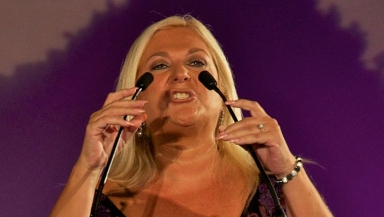Yesterday, the Irish Sunday Times published an article by freelance contributor Kevin Myers, who is a well-known misogynist and Holocaust denier.
In yesterday's article, Myers attacked two Jewish female presenters employed by the BBC.
However, the Sunday Times has apologised, removed the article and issued a statement saying that Myers will not be working for them again.

Following discussion between Campaign Against Antisemitism and News UK, which owns the Sunday Times, a further statement has been issued accepting CAA's recommendations:
'Further to our earlier statement we can confirm that Kevin Myers will not write again for the Sunday Times Ireland. A printed apology will appear in next week's paper. The Sunday Times editor Martin Ivens has also apologised personally to Claudia Winkleman and Vanessa Feltz for these unacceptable comments both to Jewish people and to women in the workplace.'
The senior management of the Sunday Times previously sent Campaign Against Antisemitism an apology over the publication of an anti-semitic column by Kevin Myers which has now been removed.
Martin Ivens, editor of the Sunday Times, said: 'The comments in a column by Kevin Myers in today's Irish edition of the Sunday Times were unacceptable and should not have been published. It has been taken down and we sincerely apologise both for the remarks and the error of judgement that led to publication.'
Frank Fitzgibbon, editor of the Sunday Times in Ireland, said: 'On behalf of the Sunday Times I apologise unreservedly for the offence caused by comments in a column written by Kevin Myers and published today in the Ireland edition of the Sunday Times. It contained views that have caused considerable distress and upset to a number of people. As the editor of the Ireland edition I take full responsibility for this error of judgment. This newspaper abhors antisemitism and did not intend to cause offence to Jewish people.'
The column by Kevin Myers contained the following paragraph about the BBC pay row: 'I note that two of the best-paid women presenters in the BBC – Claudia Winkleman and Vanessa Feltz, with whose, no doubt, sterling work I am tragically unacquainted – are Jewish. Good for them. Jews are not generally noted for their insistence on selling their talent for the lowest possible price, which is the most useful measure there is of inveterate, lost-with-all-hands stupidity. I wonder, who are their agents? If they're the same ones that negotiated the pay for the women on the lower scales, then maybe the latter have found their true value in the marketplace.'
Myers is already known as a particularly unpleasant journalist who has claimed that 'Africa is giving nothing to anyone – apart from AIDS'.
He has also devoted an entire column in the Belfast Telegraph to claiming that there was no Holocaust on the basis that not all of the Jews murdered by the Nazis were cremated, and attempting to nitpick over whether 6 million Jews really were murdered, claiming that the Holocaust had become a 'dogma'.
He wrote: 'There was no holocaust, (or Holocaust, as my computer software insists) and six million Jews were not murdered by the Third Reich. These two statements of mine are irrefutable truths, yet their utterance could get me thrown in the slammer in half the countries of the EU.'
It is clear that Kevin Myers should not have been invited to write for the Sunday Times, and his editors should never have allowed the column to be published. That they removed the column and apologised for it within hours of its publication is proof that the decision to include the column was irrefutably wrong.
It is clear that the column breached clauses 12(i) and 12(ii) of the Independent Press Standards Organisation's Editors' Code and Principle 8 of the Irish Press Ombudsman's Code of Practice by making discriminatory comments about Jews and also mentioning the religion of the Jewish BBC presenters at all.
Gideon Falter, Chairman of Campaign Against Antisemitism, said: 'In addition to no longer writing for the Sunday Times, we expect that Kevin Myers will no longer work as a journalist at any decent publication. We also understand that the Sunday Times will review its editorial procedures to examine how this lapse in editorial judgement was permitted in the first place. We do commend the Sunday Times for recognising the grave nature of this error, swiftly apologising for it and for acting to put it right.'
According to the letter of the law, the Irish Sunday Times made a mistake, and a very big one. Why on earth take on a self-confessed Holocaust denier as a columnist in the first place?
But when you look at the bigger picture, you see that on the whole in the last few years, the Times and the Sunday Times have been sympathetic towards Jewish concerns and have led the campaigns to stamp out antisemitism.
It is not the Jewish way to gloat over one mistake, however bad. And in any case, the Sunday Times has acted quickly to correct its errors of judgement.
I have worked with the Times and the Sunday Times. They are pioneers in the fight against poor education in general and campus antisemitism in particular. In the last 18 months both papers have led on this problem. Their various articles on the paucity of student experience at some of our institutions of higher education deserve a medal in their own right.
They have also led the campaign against campus antisemitism, exposing a number of universities for their attitudes towards Jews.
The work of Sian Griffiths of the Sunday Times, for instance, led to a hard-hitting interview with former Archbishop of Canterbury, Dr Rowan Williams, a sympathetic response from the Minister for Universities, an admission by one University at least that its behaviour had been antisemitic and compensation for a brave Jewish student.
Griffiths' work in exposing the indifference or worse of university Christian chaplains led earlier this year to a day conference, chaired by Rowan Williams, during which the Church of England offered to help Jewish students.
If you make a reasoned case, the Sunday Times listens.
On Tuesday I spent the entire afternoon in its London Bridge office being introduced by the executive editor to a number of senior journalists, as well as two trainee journalists, one from Manchester, who now wants to visit our Shul.
I also met a new reporter who had written a negative report about the observant Jewish community. The reporter agreed to meet me and we managed to exchange views without coming to blows.
This is what I call empathic engagement from a mature organisation.
And I returned to Manchester feeling that I had been heard.
It is obvious that the Sunday Times sincerely regrets the gross error of judgment on the part of its editor in Ireland. Not only has it expressed regret, but it acted to rectify the situation as soon as possible.
Having met many of the Sunday Times team down in London on Tuesday I have no doubt that they appreciate the Jewish contribution to life and are open to discussion.
If only all organisations were as open as the Sunday Times and corrected their mistakes so quickly.
Dr Irene Lancaster is a Jewish academic and author who has established university courses on Jewish history, Jewish studies and the Hebrew Bible.













